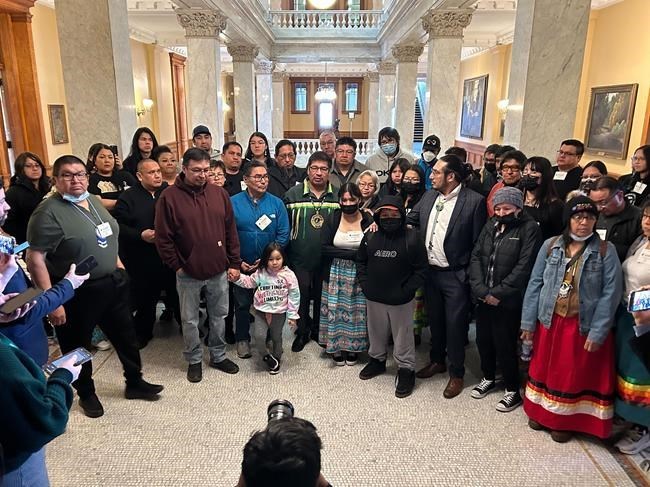TORONTO ŌĆö Leaders of northern Ontario First Nations descended upon Queen's Park in Toronto on Wednesday to deliver a message to the province: they want to be equal partners on any kind of development in their territories.
As part of making their point, the First Nations throughout Treaty 9 territory ŌĆō which encompasses much of northern Ontario ŌĆō launched a lawsuit against the province and the federal government, alleging they haven't been properly consulted on decisions involving their land.
At issue is Treaty 9, signed in 1905, which states that the First Nations "cede, release, surrender and yield" their land in exchange for designated reservations and the ability to live, fish and hunt anywhere in their territory.┬Ā
The First Nations say the governments originally pledged "co-jurisdiction," ┬Āwhich was meant to include shared decision-making on the land and water within the vast territory. But they say the governments then wrote up the treaty that included the clause, which they say was never explained to them.
They signed the treaty with the idea they would be equal partners with Ottawa and Ontario, the First Nations said.
"We never surrendered our rights," Chief Sylvia Koostachin Metatawabin, of Attawapiskat First Nation, said at the legislature.
The First Nations alleged the province makes unilateral decisions on mining, logging and developing parts of their territory without consultation.
Mining the so-called Ring of Fire region has become a major concern for many of the First Nations. The province has big plans to mine the area, which is said to be rich in critical minerals often used in batteries for electric vehicles.
The province recently approved the terms of reference from two First Nations for an environmental assessment for an all-season, multi-use road to the Ring of Fire. Webequie First Nation and Marten Falls First Nation ŌĆō which are not part of the lawsuit ŌĆō designed and submitted the now-approved plan that will link their First Nations and mining sites to Ontario's road network.
Premier Doug Ford has previously said he'll get a road built to the region even if he has to hop on a bulldozer himself.
Chief Mark Bell of Aroland First Nation said his community and others aren't on board with the plan as it stands.
"We hear so much about building mines and roads and this and that, but they don't have our community's permission," he said. "There's been zero consultation on these types of projects."
He said his First Nation is not opposed to development, the community just wants to work together with the province, as equals.
"In the past we never ceded anything, we wanted to share, we wanted to work together, we wanted to make decisions, but that hasn't happened," he said.
Two First Nations members in the public gallery shouted at Ford during question period Wednesday.
"No Ring of Fire," one yelled.
"You're not going to take our sturgeon, you're not going to take our moose," another bellowed.
Security escorted the pair out of the legislature.
Indigenous Affairs Minister Greg Rickford, responding to a question directed at the premier in the legislature about the Ring of Fire, said the government is trying to build consensus with First Nations.
"We've all gathered together to ensure that the governmentŌĆÖs priorities are to support the priorities of the Indigenous communities in and around major resource projects," he said.┬Ā
"And that the legacy requirements to support them are really about the enhancements to those communities: new forms of energy, no to diesel, yes to clean energy supply, yes to better access to health and social programs in some of our isolated communities." he said.┬Ā
Rickford's office said the province is "focused on building strong relationships with Indigenous partners" and would continue to prioritize consensus-building when it came to northern development.
The office for federal Crown-Indigenous Relations Minister Marc Miller wrote in a statement that the government "remains steadfast in its commitment to work alongside First Nations, to advance their vision for self-determination."
"Canada always prefers resolving litigation outside the courts, whenever possible. However, we respect the Treaty 9 First NationsŌĆÖ decision to take Canada to court, as they see fit,"┬Ā
A draft of the statement of claim the First Nations intend to file with court in 60 days said they are seeking declarations that First Nations hold decision-making governance over the land alongside the federal and provincial governments.
They would like a declaration that First Nations are to be consulted on every project that "threatens their way of life" and that no project would go ahead without their consent.
The First Nations are also seeking $95 billion in compensation and damages.┬Ā
"For the last 120 years, the Crown governments have been unilaterally making decisions, imposing their will and their ways, unilaterally extracting resources from the lands that comprise Treaty 9," said Kate Kempton, the First Nations' lawyer on the case.
"And so we did some math and said, basically, 'you owe about a hundred billion dollars for all the harm that you've done illegally in the last 120 years.'"
This report by The 91įŁ┤┤ Press was first published April 26, 2023.
Liam Casey, The 91įŁ┤┤ Press



